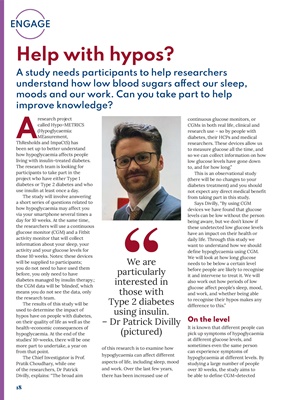
18
ENGAGE
Help with hypos?
A study needs participants to help researchers
understand how low blood sugars affect our sleep,
moods and our work. Can you take part to help
improve knowledge?
A
research project
called Hypo-METRICS
(Hypoglycaemia:
MEasurement,
ThResholds and ImpaCtS) has
been set up to better understand
how hypoglycaemia affects people
living with insulin-treated diabetes.
The research team is looking for
participants to take part in the
project who have either Type 1
diabetes or Type 2 diabetes and who
use insulin at least once a day.
The study will involve answering
a short series of questions related to
how hypoglycaemia may affect you
via your smartphone several times a
day for 10 weeks. At the same time,
the researchers will use a continuous
glucose monitor (CGM) and a Fitbit
activity monitor that will collect
information about your sleep, your
activity and your glucose levels for
those 10 weeks. Notes: these devices
will be supplied to participants;
you do not need to have used them
before, you only need to have
diabetes managed by insulin therapy.;
the CGM data will be 'blinded', which
means you do not see the data, only
the research team.
The results of this study will be
used to determine the impact of
hypos have on people with diabetes,
on their quality of life as well as and
the health-economic consequences
of hypoglycaemia. At the end of the
studies' 10-weeks, there will be one
more part to undertake a year on
from that point.
The Chief Investigator is Prof.
Pratik Choudhary, while one
of the researchers, Dr Patrick
Divilly, explains: "The broad aim
of this research is to examine how
hypoglycaemia can affect different
aspects of life, including sleep, mood
and work. Over the last few years,
there has been increased use of
continuous glucose monitors, or
CGMs in both real life, clinical and
research use - so by people with
diabetes, their HCPs and medical
researchers. These devices allow us
to measure glucose all the time, and
so we can collect information on how
low glucose levels have gone down
to, and for how long."
This is an observational study
(there will be no changes to your
diabetes treatment) and you should
not expect any direct medical benefit
from taking part in this study.
Says Divilly, "By using CGM
devices we have found that glucose
levels can be low without the person
being aware, but we don't know if
these undetected low glucose levels
have an impact on their health or
daily life. Through this study we
want to understand how we should
define hypoglycaemia using CGM.
We will look at how long glucose
needs to be below a certain level
before people are likely to recognise
it and intervene to treat it. We will
also work out how periods of low
glucose affect people's sleep, mood,
and work, and whether being able
to recognise their hypos makes any
difference to this."
On the level
It is known that different people can
pick up symptoms of hypoglycaemia
at different glucose levels, and
sometimes even the same person
can experience symptoms of
hypoglycaemia at different levels. By
studying a large number of people
over 10 weeks, the study aims to
be able to define CGM-detected
We are
particularly
interested in
those with
Type 2 diabetes
using insulin.
- Dr Patrick Divilly
(pictured)